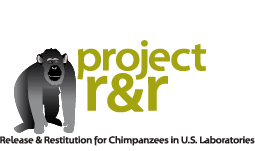May 15, 2015 • Posted in News Articles
Gorman, J. The New York Times. May 15, 2015
Animal welfare activists have scored several victories in recent years in their efforts to mandate better treatment of chimpanzees. Now they are asking a federal agency to make similar changes to the housing and treatment of monkeys.
Chimpanzees are the closest relatives of human beings, and a dwindling need for them in research, along with increasing recognition of their social and physical needs, led to a decision by the National Institutes of Health in 2013 to retire most chimps it owns from use in research. The N.I.H. also required that they be housed in ways that suit their natural social groups and behavior.
Those decisions affect the lives of hundreds of chimps owned by the N.I.H., but there are an estimated 110,000 monkeys in the country in research laboratories alone. Monkeys are more distant from humans than chimps, but they are still highly social primates, and animal welfare groups are lobbying for them to be housed in social groups and that infants not be removed from their mothers until they normally would be weaned.
Theodora Capaldo, the head of the New England Anti-Vivisection Society, said, “If we can do it for chimpanzees, we can do it for all primates.”
The Animal and Plant Health Inspection Service of the Department of Agriculture announced May 1 in the Federal Register that it was seeking public comment on a petition from the society and other groups asking for specific rules on the care of all primates regarding their social and psychological well-being.
That petition was first submitted a year ago, and the request for public comments, open until the end of June, is an important step forward, because the department has no obligation to act on petitions.
The antivivisection society joined with the North American Primate Sanctuary Alliance, the Animal Legal Defense Fund and the Laboratory Primate Advocacy Group in its petition.
In April, the Humane Society of the United States submitted its own petition, addressing very similar concerns, but requesting guidelines rather than specific rules. No action has been taken on that petition.
Kathleen Conlee of the humane society said both petitions sought similar solutions and were aimed at a failure on the part of the government to carry out the provisions of an existing law, the Animal Welfare Act, for the psychological well-being of primates.
“What Congress intended is not happening,” she said.
Although all of the groups involved would like to see experiments on primates end as soon as possible, these petitions do not ask for any changes in research or for any experiments to be stopped. The Agriculture Department has no say over research methods; it can address only the basic care of animals in labs and zoos.
The groups are asking for specific rules on “ethologically appropriate environments,” based on a provision in the Animal Welfare Act that they say is too vague to enable inspectors to enforce it.
“The law doesn’t have any teeth,” Ms. Capaldo said, because the inspection service now requires that facilities that house primates create their own plans for how to promote the psychological well-being of primates. Her organization is asking for regulatory language that would set specific requirements for facilities housing different primates, in the same way they now must follow rules for nutrition and cage size.
The humane society petition asks for guidelines rather than rules, but it addresses the same issues.
April Truitt, who runs the Primate Rescue Center in Kentucky and is on the board of the North American Primate Sanctuary Alliance, said that monkeys were “often singly housed, which is one of the most cruel things you can do to an animal that is dependent on social groupings.”
Ms. Conlee, of the humane society, said that the federal inspection service drafted a policy in 1999 that had specifics about housing and treatment of all primates, but it eventually shelved the policy.
“We’d love to see that adopted,” she said.
Once the comment period on the current petition is closed June 30, the animal and plant inspection service will consider whether to move ahead with rule making.
Lyndsay M. Cole, assistant director of public affairs for the service, said she could not predict how long that would take because it depended in part on how many comments it receives. About 900 have been posted to the website, most supporting the petition, and many objecting to any research on primates.
Read original article here.

